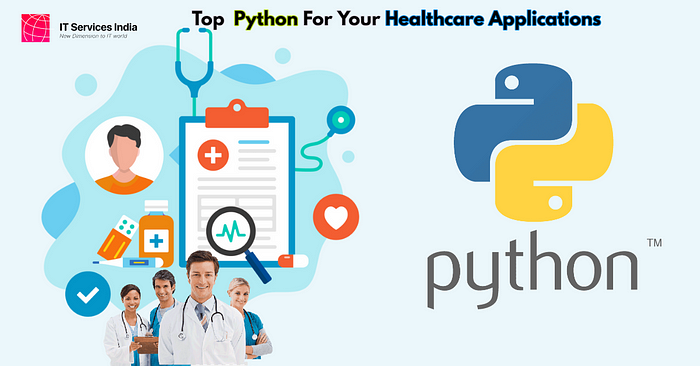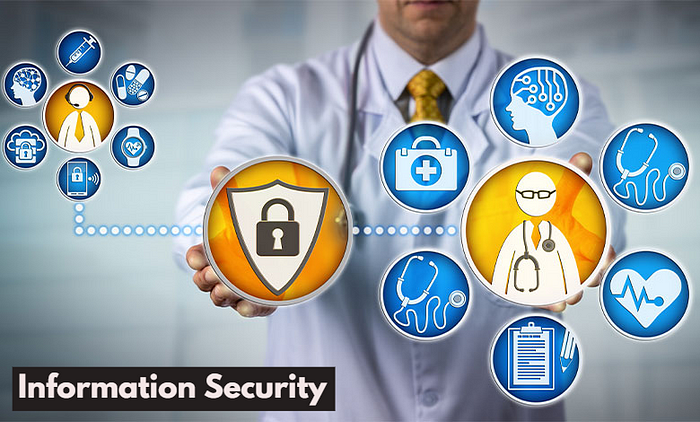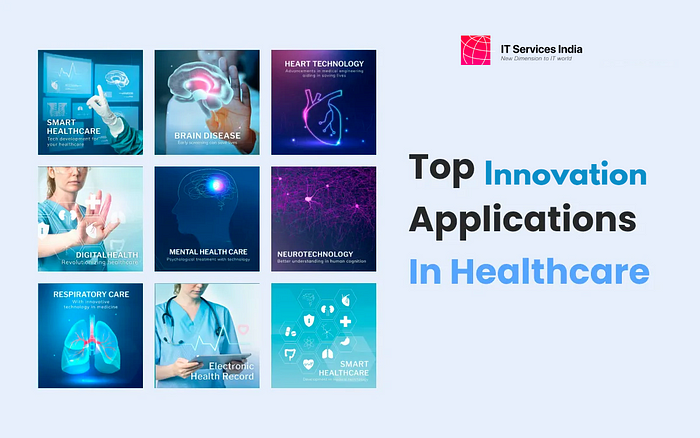Top Reasons to Consider Python for Your Healthcare Applications
One of the most significant advantages of Python in healthcare is that it can assist in making sense of data by collaborating with Artificial Intelligence and Machine Learning in healthcare. By combining Python with data science to manage patients, physicians, and nurses, hospitals may be able to save time and effort.
Healthcare is a rapidly expanding industry, which necessitates an increase in the demand for technology, software, and coding languages. In our society, the healthcare industry and healthcare applications have a long and noble history. It has always been there to help and support those in need. During the pandemic, healthcare provided critical care and support to a large number of people. It was one of the first industries to be affected by the pandemic, and its workers rose to the occasion.

Healthcare has always been an ever-growing industry, which has resulted in an increased demand for technology, software, and coding languages. With so many advances being made in the field of healthcare, it is no surprise that Python remains one of the most popular programming languages for this type of application. Python is the best language for healthcare applications for a variety of reasons, and we will go over a few of them here.
Since its inception, evolving technology has aided the healthcare system. Healthcare providers have been quick to adopt new technology in order to meet their patients’ ever-changing needs. This has included the implementation of newer coding languages and software. Python is a popular programming language for healthcare applications for several reasons.
Python for Healthcare Applications
Python is a popular language for healthcare applications due to its simplicity and breadth of applications. It is most commonly used in scientific computing and data analysis and has been used in a variety of medical settings, including hospitals and clinics. Furthermore, Python is well-known for its readability, making it simple to grasp and adapt to various applications.
It is frequently used to create healthcare solutions ranging from web-based applications to artificial intelligence and machine learning. The technology and healthcare industries have traditionally worked together to improve people’s lives, and many healthcare developers are increasingly turning to Python for its flexibility and scalability.
However, most of the time, we require clarification on why Python is best suited for healthcare. As a result, in this blog post, we have provided you with a few compelling reasons to choose Python for Healthcare Application Development.
Why Choose Python for Healthcare Applications Development?
Versatile & Flexible
The healthcare industry, more than any other, requires intuitive applications that can meet a wide range of needs. This is exactly where Python shines. Its flexibility as a dynamic scripting language allows it to meet a wide range of healthcare needs. It is capable of rapidly adapting to changes and new requirements, making it ideal for the ever-changing healthcare landscape.
Python’s versatility and flexibility make it an ideal language for developing healthcare applications. It can develop a wide range of online and offline applications for a variety of healthcare applications, including web-based applications, artificial intelligence, machine learning, and data analysis. Python enables developers to create robust healthcare applications that can be easily integrated into existing systems.
Information Security
Healthcare data is among the most sensitive in any organization and must be handled with extreme caution. With the rise of cyber-attacks and data leaks, it’s no surprise that healthcare organizations are turning to Python for its security features. Python provides the best solution for safeguarding healthcare data due to its well-known data protection measures such as encryption and randomization, as well as its ease of use and extensibility.

Python development is advantageous because its frameworks enable secure data interchange, and its requirement to integrate data for a better user experience is validated by HIPAA compliance. These characteristics make Python an ideal language for healthcare applications that rely on data interchange and integration.
Faster Protection
While traditional approaches include a trial-and-error procedure involving the combination of several compounds to determine the most effective and safe treatment for each illness, Python provides a more streamlined and efficient solution. Because of its powerful libraries and frameworks, developers can easily create powerful healthcare applications that can be easily integrated into existing systems. Furthermore, because of its readability and versatility, it is an excellent choice for developers looking to create powerful healthcare applications that can be easily integrated into existing systems without the need for trial and error.
Image Analysis
Imaging technologies like MRI, X-ray, and ECG scans are critical in giving doctors a clear picture of the patient. They can not only diagnose certain medical conditions, but also provide images that show the doctor what the naked eye cannot see. This is particularly important for patients suffering from diseases that are difficult to detect with the naked eye, such as cancer. Doctors can accurately diagnose patients and provide them with the best possible treatment by taking pictures and scanning them.
Predictive Healthcare
Predictive healthcare using machine learning and deep learning has grown rapidly in recent years as clinicians seek ways to track and forecast the severity of a patient’s illness. Python has proven to be an advantageous language for this purpose because its frameworks allow for safe data interchange, and its requirement to integrate data for a better experience is validated by HIPAA compliance.
Hospital Management
The need for effective patient management grows in tandem with the number of patients in a healthcare organization. With so many patients to keep track of, manually assigning them to available doctors becomes increasingly difficult. Python comes in handy here because its powerful libraries and frameworks make it simple for developers to create powerful healthcare applications that can automate patient management. Healthcare organizations can free up staff to focus on more critical tasks, such as patient care, by automating this process.
Effective Patient Care
Python-powered healthcare applications can handle a variety of tasks, including patient data management, appointment scheduling, and consultations. These applications can also track a patient’s health and notify medical personnel if anything changes. By automating time-consuming tasks like managing patient records, healthcare organizations can free up valuable time and resources to better care for their patients. Furthermore, Python-powered applications are highly secure, protecting patient data from unauthorized access or manipulation.
Innovation in Healthcare Applications
The healthcare industry is rapidly embracing machine learning (ML) to save billions of dollars while providing better care. Python, with its various libraries and frameworks, provides a more efficient solution than traditional methods. Doctors can use Python to scan photos and diagnose patients more precisely when combined with artificial intelligence (AI) and machine learning. This technology can assist physicians in identifying diseases or medical conditions that are difficult to detect with the naked eye.

Around-the-clock Availability
One of the most important aspects of healthcare delivery is patient management. Healthcare organizations can ensure that everyone receives the best possible care by giving patients constant access to the resources they require. This includes providing patients with the resources they require 24 hours a day, seven days a week. Python gives healthcare organizations the tools they need to manage patient data safely and securely, as well as predict and forecast the severity of a patient’s illness.
IT Services India has a large pool of Python developers who have built high-quality applications for a variety of business verticals. These dedicated developers have years of experience in the healthcare industry and are well-equipped to handle any project you may have. We have the right developer for you whether you need help with a simple project or a specialist to handle a more complex project.



Comments
Post a Comment